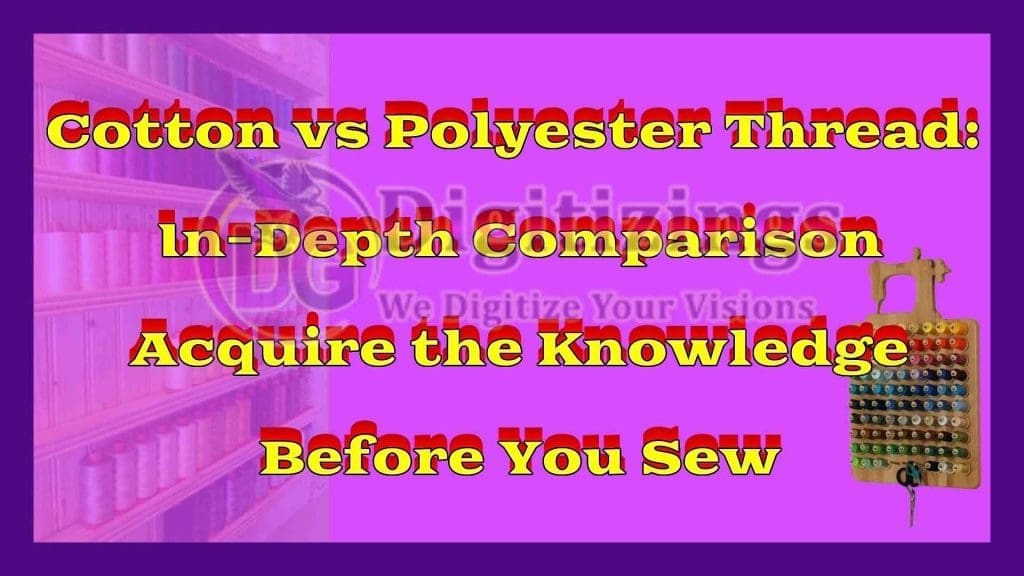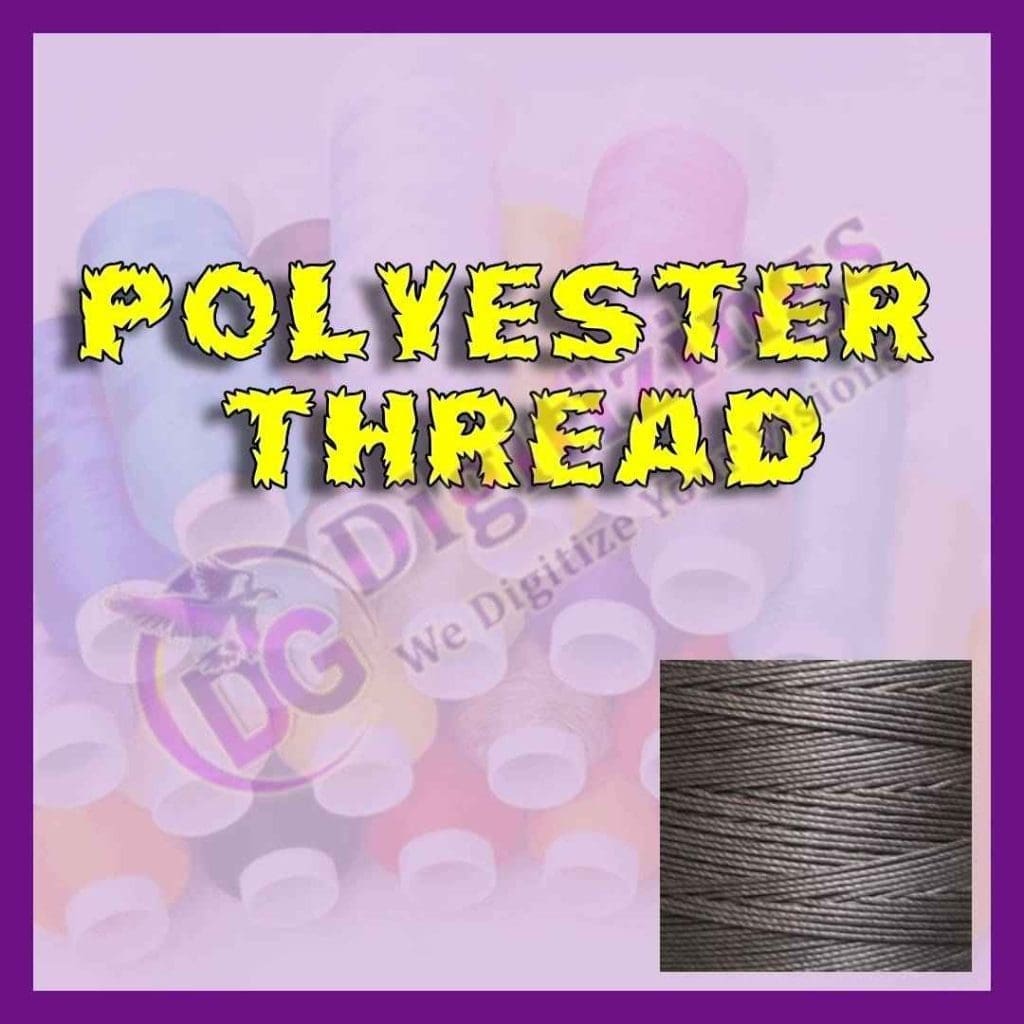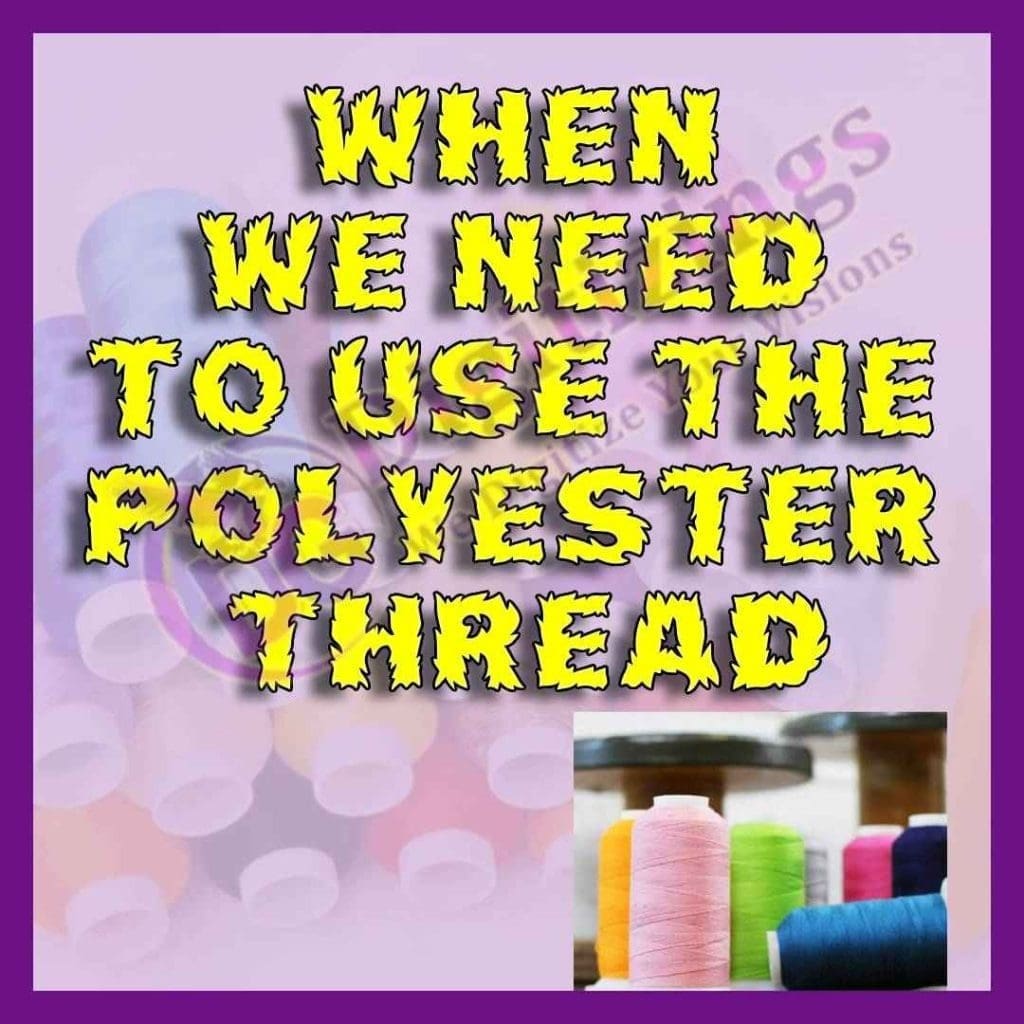Cotton vs Polyester Thread: In-Depth Comparison
Cotton vs Polyester Thread: In-Depth Comparison. Acquire the Knowledge Before You Sew.
When it comes to choosing thread for your embroidery projects, understanding the differences between cotton vs polyester thread is essential. Cotton thread is a popular choice among embroiderers due to its natural fiber composition, which provides a soft and matte finish.
It is known for its excellent absorption capabilities, making it ideal for projects that may come into contact with moisture. On the other hand, polyester thread offers its own set of advantages. Being a synthetic fiber, polyester is incredibly strong and durable, making it suitable for designs that require high tensile strength.
It also has a lustrous sheen, giving your embroidery a vibrant and glossy appearance. Additionally, polyester thread is resistant to fading and shrinking, making it a great option for items that will undergo frequent washing. Consider the specific requirements of your project and the desired aesthetic before making your decision between cotton and polyester thread.

An Overview of Cotton vs Polyester Thread

Cotton Thread:
Cotton thread is a popular choice for various sewing and embroidery projects due to its unique characteristics. Derived from the natural fibers of the cotton plant, this type of thread offers several advantages. One of the key benefits of cotton thread is its softness and smoothness, which allows it to glide easily through the fabric without causing damage or abrasion.
Cotton thread is also highly absorbent, making it ideal for applications that may come into contact with moisture, such as quilting, towel embroidery, or projects involving kitchen or bathroom accessories.
Another advantage of cotton thread is its ability to blend seamlessly with natural fabrics, creating a cohesive and harmonious look.
Additionally, cotton thread is often available in a wide range of colors and weights, allowing for versatility and customization in embroidery designs.
However, it’s worth noting that cotton thread may not be as strong as synthetic options like polyester, so it may not be the best choice for projects that require high tensile strength.
Despite this, the cotton thread remains a popular and reliable option for many sewing enthusiasts, offering a classic and organic touch to their creations.
Polyester Thread

Polyester thread is a versatile and widely used option in the world of sewing and embroidery. Made from synthetic fibers, polyester thread offers several advantages that make it a go-to choice for many projects. One of the primary benefits of polyester thread is its exceptional strength and durability.
It can withstand high tension, making it suitable for applications that require resilience and long-lasting seams. Additionally, polyester thread has a lustrous sheen that adds a vibrant and glossy appearance to embroidery designs.
It is also resistant to fading, shrinking, and wrinkling, making it an excellent choice for items that will undergo frequent washing or exposure to sunlight. Polyester thread comes in a wide range of colors and weights, allowing for versatility and creativity in stitching.
Whether you’re working on apparel, home decor, or intricate embroidery, polyester thread offers reliability, visual appeal, and durability to your projects.
Distinction: Cotton And Polyester Thread . . .
Cotton and polyester threads are two popular choices for sewing and embroidery, each with its own set of characteristics and benefits. Cotton thread is derived from natural fibers and is known for its softness, smoothness, and matte finish.
It is highly absorbent, making it suitable for projects that may encounter moisture. Cotton thread blends seamlessly with natural fabrics and offers a classic, organic look. However, it may not have the same strength as polyester thread and can break under high tension.
Polyester thread, on the other hand, is made from synthetic fibers and is exceptionally strong and durable. It has a lustrous sheen, providing a vibrant and glossy appearance to embroidery.
A polyester thread is resistant to fading, shrinking, and wrinkling, making it ideal for items that require frequent washing. It is also a good choice for projects that demand high tensile strength.
However, the polyester thread can sometimes create a slight sheen mismatch when used with natural fabrics. Ultimately, the choice between cotton and polyester thread depends on the specific requirements of your project, the desired aesthetic, and the level of durability needed.
In summary, cotton thread offers excellent durability, making it suitable for projects with high stress on the thread, while polyester thread excels in wear resistance and is less prone to shrinking and fading.
Consider the specific needs of your project and the expected conditions the thread will encounter to determine whether cotton or polyester thread is the better choice for your sewing or embroidery endeavors.
Is Cotton Thread Better than Polyester Thread?
Determining whether cotton is better than polyester or vice versa depends on the specific requirements of your project and personal preferences. Both cotton and polyester have their own advantages and considerations to keep in mind.
Cotton is a natural fiber that is known for its softness, breathability, and ability to absorb moisture. It is a popular choice for clothing and items that come into direct contact with the skin, as it provides comfort and allows air circulation. Cotton is also biodegradable and environmentally friendly.
On the other hand, polyester is a synthetic fiber that offers exceptional durability, strength, and resistance to wrinkles and shrinking. It is often used in high-performance garments and items that require longevity and resistance to wear and tear. Polyester is also quick-drying and retains its shape well.
The choice between cotton and polyester depends on factors such as the intended use of the item, desired characteristics (e.g., softness, moisture absorption, durability), and personal preferences. For example, if you prioritize breathability and natural fibers, cotton might be the better option. If durability and wrinkle resistance are crucial, polyester may be the preferred choice.
Ultimately, it is beneficial to consider the specific qualities and requirements of your project and select the thread or fabric that aligns best with those needs.
When Do We Need To Use The Polyester Thread?

Polyester threads are an excellent choice for various situations and projects. Their durability and strength make them ideal for applications that require resilience and long-lasting seams.
If you’re working on heavy-duty fabrics, such as denim or canvas, or creating items that will undergo frequent use and washing, polyester thread is highly recommended. It is also suitable for outdoor projects and items exposed to the elements, as polyester is resistant to fading, shrinking, and moisture absorption.
Additionally, polyester threads offer a vibrant and glossy appearance due to their lustrous sheen, making them perfect for decorative stitching and embroidery designs that require a pop of color and shine.
Overall, polyester threads excel in high-stress and demanding sewing situations, providing durability and longevity to your projects.
Can We Use Polyester Thread On Cotton Fabric?
Yes, you can use polyester thread on cotton fabric. Here are some key points to consider:
Compatibility: Polyester thread can be used with cotton fabric without any major issues. They are compatible and will work well together.
Strength: Polyester thread is known for its strength and durability. When used on cotton fabric, it provides strong and secure stitches that can withstand regular wear and washing.
Longevity: Polyester thread is resistant to shrinking, fading, and fraying, making it suitable for projects that require long-lasting results on cotton fabric.
Versatility: Polyester thread comes in a wide range of colors and weights, offering versatility in matching or contrasting with cotton fabric for various sewing and embroidery projects.
Considerations: Keep in mind that polyester thread has a different appearance and sheen compared to cotton thread. It may create a slight contrast in the finished product, so consider the aesthetic effect you desire.
In summary, using polyester thread on cotton fabric is a common practice that provides strength, durability, and longevity to your sewing projects.
Which One Cotton And Polyester Thread Better For Sewing
Whether cotton or polyester thread is better for sewing depends on the specific project and personal preferences. Here are some considerations for each:
Cotton Thread:
- Softness: Cotton thread is softer and more natural in feel, making it suitable for projects where comfort against the skin is a priority.
- Absorbency: Cotton thread has excellent absorbency, making it a good choice for sewing items that may come into contact with moisture, such as towels or garments.
- Blending with Fabric: Cotton thread blends well with cotton and other natural fabrics, creating a cohesive and seamless look.
- Natural Fiber: Cotton is a renewable and biodegradable material, making it an environmentally friendly choice.
Polyester Thread:
- Durability: Polyester thread is stronger and more durable than cotton thread, making it ideal for projects that require high tensile strength or will undergo heavy use.
- Resistance: Polyester thread is resistant to shrinking, fading, and wrinkles, making it suitable for items that will be washed frequently or exposed to harsh conditions.
- Versatility: Polyester thread comes in a wide range of colors and weights, offering versatility and options for various sewing and embroidery projects.
- Synthetic Fiber: Polyester is a synthetic material, so it may not have the same natural feel as cotton and may not blend as seamlessly with natural fabrics.
Ultimately, the choice between cotton and polyester thread depends on the specific needs of your project. Consider factors such as fabric type, desired durability, appearance, and personal preferences to determine which thread is better suited for your sewing endeavors.
Benefits Of Cotton And Polyester Thread
Cotton Thread:
- Softness: Cotton thread is known for its soft and smooth texture, making it comfortable against the skin.
- Absorbency: Cotton thread has excellent absorbency, making it suitable for projects that may come into contact with moisture, such as towels or garments.
- Natural Look: Cotton thread blends seamlessly with natural fabrics, providing a cohesive and organic appearance to the finished project.
- Environmental Friendliness: Cotton is a renewable and biodegradable material, making cotton thread a more sustainable choice.
Polyester Thread:
- Durability: Polyester thread is highly durable and strong, making it ideal for projects that require resilience and long-lasting seams.
- Colorfastness: Polyester thread is resistant to fading, ensuring that the color remains vibrant even with frequent washing and exposure to sunlight.
- Wrinkle and Shrink Resistance: Polyester thread retains its shape well and is resistant to wrinkling and shrinking, making it suitable for items that require dimensional stability.
- Versatility: Polyester thread comes in a wide range of colors and weights, offering versatility and options for various sewing and embroidery projects.
The choice between cotton and polyester thread depends on factors such as desired softness, absorbency, durability, colorfastness, and environmental impact.
Consider the specific requirements of your project and select the thread that best aligns with your needs.
Conclusions:
In conclusion, cotton and polyester threads both have their own advantages and considerations. Cotton thread offers softness, absorbency, and a natural look, while polyester thread provides durability, colorfastness, and versatility.
The choice between the two depends on factors such as desired texture, project requirements, and personal preferences.
Consider the specific needs of your sewing or embroidery project to determine whether cotton or polyester thread is the better option for you.










